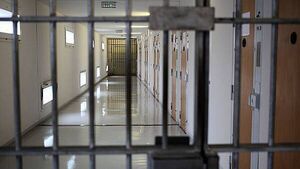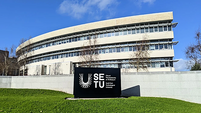3 babies born to inmates in Irish prisons and 19 pregnant women jailed to date in 2025

Gordon Deegan
Three babies have been born to inmates at the Dóchas Centre women’s prison in Dublin and Limerick’s women’s prison to date this year, new figures show.
According to the new figures provided by the Minister for Justice, Home Affairs and Migration, Jim O’Callaghan TD, four infants aged under 12 months, three at Dóchas and one at Limerick - have been accommodated with their mothers at the female prisons to date this year.
This followed three infants being accommodated with their mothers at Dochas Centre only in 2024.
The three babies born to inmates across the Irish prison estate this year follow four babies born to inmates in 2024.
This followed no babies born to prison inmates in 2023 and 2022 and there was only baby born to a woman jailed at Dóchas Centre prison at the time during 2021 and 2020.
In written Dail replies to Deputies Gary Gannon TD and Matt Carthy TD, Minister O'Callaghan confirmed that two babies have been born to inmates at Dóchas Centre to date this year and one baby to an inmate at the 50-capacity Limerick’s women’s prison.
In the replies, Minister O’Callaghan also reveals that in 2025, 19 pregnant women have imprisoned at Irish prisons - 13 at Dóchas and six at Limerick.
This followed 27 pregnant women being jailed last year - 22 at Dóchas and five at Limerick and the 27 total was more than double the 12 total for 2023.
In his reply Minister O’Callaghan told the two deputies: “I can confirm that there are currently no pregnant women remanded to custody within the Irish Prison Estate.”
He said: “Pregnant woman in custody are provided with as much privacy as possible and are accommodated in single occupancy rooms.”
He said that in accordance with prison rules “a child may remain in the care of their mother in prison, until the child has reached twelve months of age”
He added that, in the Dóchas Centre, mothers and babies are accommodated in single occupancy double rooms.
“These rooms are on a small landing which is shared with enhanced status prisoners. Work is commencing in relation to additional, bespoke rooms for mothers and babies in the Dóchas Centre.”
“Limerick Women's Prison does not have a separate building for women with children, however the women and their babies are accommodated in ‘independent style apartments’.
“Each has their own individual apartment. This overall area is not specifically for women with babies and may house other prisoners deemed suitable to live in these "independent style apartments”.
O’Callaghan said that, in relation to the health and safety of pregnant women in custody, the Irish Prison Service has developed and apply bespoke risk assessments to both pregnant women and to mothers and babies who are in their custody.
“These risk assessments inform strategies which support managing the health and safety of pregnant women, and mothers who have given birth to babies whilst serving prison sentences, within the prison environment.”
He said that the Irish Prison Service employs a National Family Connections Officer and Iin May 2025 this officer established a multi-agency working group to review Protocols and update the Irish Prison Service Mother and Baby Policy to ensure best practice for the care and support of mothers and babies in custody.
He said: “This work is currently at scoping stage.”
Minister O’Callaghan said that “the level of maternity care and supports provided to women in custody, is comparable to that available to women in the community”.
"Primary care nursing is provided in female prisons on a 24/7 basis, 365 days a year. Doctor services are available Monday to Friday 9-5, with locum services available at the weekends.
"Due to the specific needs of a number of the women who are pregnant, specialist HSE services have a very close and responsive working relationship with both prison management and the prison healthcare team.
“Most pregnant women receive all their antenatal care external to the prison, in routine antenatal clinics in the local HSE maternity hospital. When needed and in cases of emergency, specialist midwives will attend the prison; however, this is not a common occurrence.”
He added that “expectant mothers are always facilitated to have their children born in hospital”.




